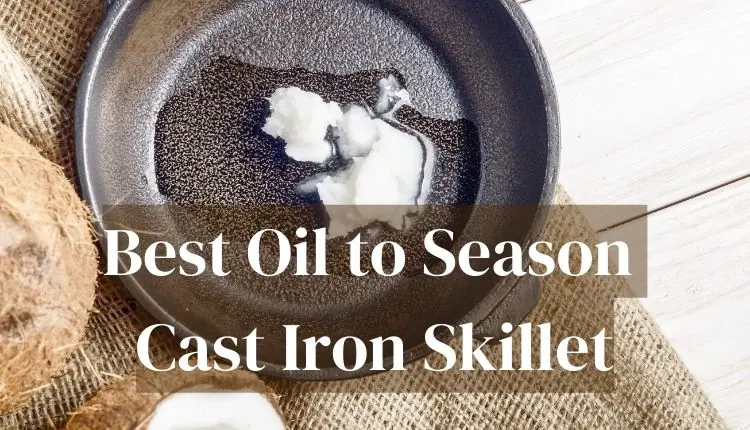Do you want to achieve the finest quality and delectable flavors on your meals when using a cast iron skillet? Our refined list of the best oil to season a cast iron skillet can help you achieve this.

Whether you want to sear the perfect steak, iron pan roast veggies, or bake cornbread, a cast iron skillet is a handy tool to have. A cast iron skillet is pretty versatile, letting you use it for searing, baking, sauteing, frying, or broiling, to name a few.
However, using an unseasoned cast iron skillet never guarantees the best results. An unseasoned cast iron skillet makes it easy for food to stick to the surface, burns cooking oils, cooks unevenly, and is susceptible to rust build-up.
The solution to this problem is simple. Cast iron care can truly elevate your cooking experience while also allowing for longer, better use of your cast iron pan.
Seasoning your cast iron skillet with the right oil creates a smooth surface barrier that facilitates easy food release, heats oils in the right moderation, and promotes even heat distribution and retention. A seasoned cast iron skillet also prevents the skillet from rusting.
Whether you choose to sear, bake, or braise it, an adequately seasoned cast iron skillet guarantees better flavor and overall food quality.
So, we’ve spent months testing various top-rated types and brands on the market, to help you find the right seasoning oils. After several trials, we managed to narrow down the list to the top 10 finest oils to use.
Background and History of Seasoning Cast Iron Skillets
You can trace the first use of cast iron skillets to the Han Dynasty in China, as early as 220 AD. During this time, cast iron skillets were used for their versatility and durability.
Even during the earlier days, cast iron skillets were still seasoned with oil to prevent rusting and accommodate the typical high heat cooking of many of the dishes. Cast iron skillets were introduced to the western world around the 16th century and continue to be popular to date.
Today, many manufacturers produce pre-seasoned cast iron skillets, making them ready to use out of the box. However, after several uses, you have to reseason them with cast iron cookware oils.
What Exactly Is To “Season” A Cast Iron Skillet?
Seasoning a cast iron pan simply means applying a layer of vegetable oil or animal fat to it. When heated, the seasoning oil creates a stick-resistant coating due to its polymerization (the oil heats up at a high temperature, causing its smaller monomer chains to link and form large polymer chains).
The polymerization process causes the liquid oil or fat to transform into a solid, hardened layer that protects the cast iron surface.
Seasoning cast iron comes with various benefits. These include:
- Facilitating even heat distribution and better heat retention
- Requiring less oil when cooking
- Preventing cooking oils/fats from burning
- Promoting easy food release (preventing food from sticking to the surface)
- Preventing rust build up (creates a water/moisture/airproof barrier)
- Improving food quality, flavor, and appearance
What Do I Need To Season A Cast Iron Skillet?
You need three key items to season a skillet. These include:
Seasoning Oil
This is the oil you will use to create the actual seasoning layer on the skillet.
Salt
Salt plays a significant role in the seasoning process. Lined at the bottom of the pan before adding the oil, it helps to break down any residues or food stuck at the bottom of the pan.
Paper Towels
After the oil heating process, you’d use a ball of paper towels to rub the pan to make the surface smooth.
Note: If you choose to season your skillet in the oven instead of the stove, you will not need salt or paper towels.
What Can Degrade A Cast Iron Seasoning Layer?
Several things can degrade your cast iron skillet seasoning, including foods and cleaning items.
For example, during testing different seasoning oils, the one common issue we noticed is the swift decline of the seasoning when we prepared tomato sauces or added citric juices. Additionally, the use of dish soap (even mild dish soap) quickly washed off the seasoning coat completely.
Here’s what you should avoid adding to your skillet to protect the seasoning layer:
- Cooking acidic foods like tomatoes or citric fruits
- Leaving standing water
- Overheating the skillet (typically, above 500 degrees Fahrenheit)
- Using metal utensils over long periods
- Cleaning the skillet using dish soap or steel wool
- Tossing the skillet into a dishwasher
- Not cleaning the skillet for a long period
Buying Guide: How To Choose The Best Oil To Season A Cast Iron Skillet
Here’s what to look out for when picking the ideal seasoning oil for a cast iron skillet:
Type Of Oil
The first factor you should focus on is the type of oil. You can season your pan with a wide range of oils based on your preferences. However, you have to remember that each oil type comes with its characteristics.
Grapeseed oil and flaxseed oil stand out amongst the best-recommended oils for seasoning a cast iron skillet. Flaxseed oil is particularly favored for seasoning due to its great polymerization results.
It features molecules with multiple double bonds that can break and reattach to other molecules. This, in turn, allows flaxseed oil to form a hard coating when you use it to season cast iron pans.
However, the flaxseed oil can go rancid pretty quickly and tend to be more expensive than other types of oils. Similar to flaxseed oil, grape seed oil offers a great polymerization effect, producing a harder and longer-lasting seasoning layer.
Other oils include:
Canola Oil
Canola oil best serves those on a budget thanks to its affordability. It also works best due to its neutrality, ensuring it doesn’t compete with the flavors of the food you cook.
You might even already have this cooking oil readily available in your pantry, which you now know you can use to season cast iron pan.
However, you will not get premium results (the coating may break down easily) as you would with oils like flaxseed or grape seed.
Coconut Oil
Coconut oil works great for those who want to enjoy its fragrant characteristics. However, it’s not the best option.
Its saturated fat content means it won’t harden as much during the polymerization process. Plus, it can be somewhat expensive.
Peanut Oil
Like coconut oil, its fragrant nature works for some dishes but may impact others negatively. But, it has one of the highest smoke points.
Avocado Oil
Avocado oil is one of the best seasoning oils since it creates a durable and long-lasting seasoning coat. However, it can be quite costly.
Other Options
You can also opt for oils made with different blends to enjoy the best characteristics of each kind. Some cooks use saturated fats like butter and animal fat to naturally season their skillets.
Using these fats will not work perfectly at first. You will still have some uneven parts and it won’t be fully black. But, after a few takes, you will have a perfectly seasoned skillet.
While many vegetable oils work great for seasoning cast iron skillets, you want to stay away from one particular kind, i.e. olive oil. Olive oil has a pretty low smoke point. So, when using it to season your pan, it will cause more damage than doing good.
Sunflower oil can also be used since it has a high smoke point and neutral flavor.
Oil State
Cast iron skillet oils come with different consistencies. You will come across oils in liquid, solid (sticks or balms), or compressed liquid (spray canisters).
The choice of which consistency to go for depends on your preferences. During our testing process, we found spray oils to be more convenient since you don’t have to spend hours rubbing.
Temperature Rating/Smoke Point
When picking cast iron oils, pay attention to the smoke point. During the seasoning process, you have to heat up the oil.
Therefore, you want oils with a high smoke point, like flaxseed and grape seed oil, to handle the heat. Ideally, cast iron oils should have a smoke point of between 400 and 500 degrees Fahrenheit.
The reason why extra virgin olive oil isn’t the best option is its ultra-low smoke point, at around 350 degrees Fahrenheit. On a side note, the low smoke point makes olive oil great for uncooked food (salads) and low-temperature cast iron cooking.
Natural or Not
You are better off going with natural or organic oils. Organic and natural oils contain zero chemicals or synthetic ingredients that can potentially leach and harm your food.
If you are a vegetarian, go a step further and look for non-animal fats. You should opt for oils made from plants, seeds, nuts, or fruits.
Aromatics
Oils such as coconut and peanut tend to be quite aromatic and can interfere with the natural flavor of your food. If you want to avoid this, you should opt for neutral oils like grapeseed, flaxseed, or canola.
Shelf Life
Take note of the shelf life when choosing oils.
You don’t want to go for oils that can turn rancid quickly. Consider how often you season cast iron cookware when picking the right oils.
1. Kuche Chef Flaxseed Cast Iron Oil
The Kuche Chef Flaxseed Cast Iron Oil comes with great value as it allows you to use it on any cast ironware. The cast iron oil features a 2-in-1 seasoning and conditioner formulation to leave a non-stick and clean shiny surface on your cast ironware.
In fact, this oil works great for those who want to season and maintain the look of any of their cast iron kitchen items. Utilizing 100% natural flaxseed oil, the US-made cast iron oil offers an incredibly hardened and long-lasting layer that withstands various cooking.
Additionally, the flaxseed oil used in the formula contains a high omega-3 fatty acid content to boost the nutrients in your meals.
Pros
- Best for all types of cast iron ware
- 2-in-1 cast iron seasoning oil and conditioner
- US-grown and cold-pressed flaxseed oil
- Flaxseed oil packs high omega 3 fatty acid levels
Cons
- It may require multiple coats for the best results
2.Caron Doucet Ultimate Cast Iron Set
The Caron Doucet Ultimate Cast Iron Set contains the necessary tools for the care and maintenance of your cast iron skillet. The set includes seasoning oil, cleaning soap, and restoring scrub, ensuring you cover every essential maintenance step.
However, the best part of using this budget-friendly kit is you can use it on cast iron skillets, pans, and grills. The food-grade refined coconut formula is also pretty gentle on the hands and the cast iron surface.
Unlike regular dish soap, the special cast iron soap packs natural oils to promote a long-lasting seasoning coat on your skillet. On the other hand, the restoring scrub and seasoning oil maintain and preserve the skillet’s overall sheen while maintaining a non-stick, protective layer.
Plus, during the entire cleaning, restoration, and seasoning process, a proprietary blend of pure essential oils eliminates food odors from your ware.
Pros
- Best for maintenance and care
- 3-in-1 seasoning oil, soap, and restoration scrub
- Effortlessly removes stubborn rust spots and restores cast iron
- 100% plant-based coconut oil with zero toxic chemicals
Cons
- Produces somewhat of a coconut-like aftertaste
3.Lodge Seasoning Oil Spray
The Lodge Seasoning Oil Spray works great for those who seek convenience. Not everyone enjoys the long painstaking process of restoring a cast iron skillet.
So, during our testing process, we found this seasoning spray to significantly cut down on the time-consuming process. Housed in a non-aerosol spray bottle, using this seasoning oil is pretty simple, particularly for the oven seasoning process.
All you have to do is spray a layer of oil around the entire skillet and toss it into the oven for the seasoning process to complete. Made from 100% canola oil, the 8-ounce spray bottle has a high smoke point, at around 500 degrees Fahrenheit.
The high smoke point guarantees a clean and protective finish on your skillet. To make it even more convenient to use, the bottle features adjustable spray settings.
Pros
- Best for Convenience – spray the skillet and toss it in the oven!
- Made in the USA
- Very high smoke point (500F+)
- Adjustable spray output
Cons
- Oil can leak out through the spray valve
4. Culina Cast Iron Set
Whether you have an old beat-up or antique cast iron skillet to restore, the Culina Cast Iron Set is what you want to invest in.
In addition to the seasoning oil stick, the set comes with the necessary tools for successful cast iron restoration. The set also contains cast iron soap, oil conditioner, restoring scrub, and stainless steel scrubber for a full cast iron restoration.
The set features a 100% plant-based formulation with zero petrochemicals, parabens, or other toxic chemicals. This, in turn, guarantees effective cleaning and seasoning while the formula remains gentle on the cast iron ware and hands.
In fact, even the soap contains a blend of oils to prevent degrading the seasoning. The use of a seasoning oil stick ensures your entire skillet is sufficiently coated.
Pros
- Best for cast iron restoration
- Restoration optimizer set with oil stick, conditioner, scrub, and metal scrubber
- Natural oils remain gentle on the hands and skillet
- Odor eliminating formula
Cons
- A little costly
5. Crisbee Stik® Cast Iron and Carbon Steel Seasoning Oil
If the value remains your priority, you should consider the Crisbee Stik Cast Iron and Carbon Steel seasoning Oil. The cast iron skillet seasoning oil guarantees the cleanest non-stick look on your cookware without having to break the bank.
In addition to its working magic and affordability, the seasoning oil features one of the most unique formulas that allow it to work for both cast iron and carbon steel skillets. The seasoning oil comes in a solid stick to ensure a thorough and convenient coating.
Moreover, the formula contains a blend of soybean oils, beeswax, and non-GMO palm oil to create a hard and long-lasting seasoning layer. In addition to its waterproof qualities, beeswax helps the layer hold for longer, even if you wash the skillet with regular dish soap.
Pros
- Best for producing the cleanest seasoning look
- Affordably priced
- Beeswax gives it a waterproof and long-lasting layer
- 100% all-natural, non-GMO oil blend
Cons
- It may be difficult to apply to corners of the cookware
6.Cast Iron Sam’s 100% Natural Cast Iron Seasoning Oil
If you are on a cash-strapped budget, the Cast Iron Sam’s 100% Seasoning Oil has you covered.
The 100% premium coconut seasoning oil offers a superior and long-lasting coating. The oil also acts as a conditioner to boost the durability of your cast ironware.
The use of coconut oil also means you don’t have to add in a lot of oil during the seasoning process, letting you use it over a long period. This is thanks to its high smoke point.
On the other hand, its fragrant nature lets the oil naturally control and eliminate food odors built up on your skillet. The 100% all-natural coconut oil formula also makes the seasoning oil great for vegetarians and vegans.
Pros
- Best for tight budgets
- Great for vegans and vegetarians
- Very little oil is sufficient for seasoning
- Works as a seasoning oil and conditioner
Cons
- Leaves some coconut smell
7.Knapp Made Cast Iron Seasoning Oil and Conditioner
The Knapp Made Cast Iron Seasoning Oil and Conditioner allows you to enjoy the best of different oil blends. The cast iron seasoning and conditioner incorporates an innovative blend of all the best seasoning oils to give you incredible performance.
It features a blend of natural grape seed and canola oil to produce a hard, long-lasting, and incredibly shiny finish.
Additionally, the blend contains beeswax which preserves the coating further while giving the skillet a waterproof barrier. This unique blend of cast iron seasoning oil also lets you use it on various items in your kitchen.
You can use it to restore, season, and condition cast iron, steel, cutting boards, and grill tops.
Pros
- Best for cast iron, steel, leather, stone, and wood
- Comes in a wax state for thorough application
- Seasons, restores, and conditions
- It combines beeswax and high smoke point oils
Cons
- Can be a little harsh on the skin
8. Clarks Cast Iron Seasoning Oil
The Clarks Cast Iron Seasoning Oil is specially formulated for your struggles with moisture build-up. Whether it’s the climate or your kitchen setup causing increased moisture, the cast iron oil works to protect your skillet.
The refined coconut oil is formulated to keep liquids and moisture out of the cooking surface to prevent rust build-up.
Moreover, the seasoning oil works for various kitchen items, including carbon steel cookware. However, the best part of using the oil is its ease of application. All you do is rub the oil after cleaning and drying, without having to toss it on the stove or into the oven.
Pros
- Best for preventing moisture build-up
- Works with cast iron and carbon steel
- Doesn’t need heating for the seasoning process
- Creates a superior non-stick finish
Cons
- The smoke point is slightly low
9.Creation Farm Foodieville Cast Iron Oil
The Creation Farm Foodieville Cast Iron Oil integrates a powerful blend of everyday kitchen oils to boost its seasoning performance. The formula uses oils with a high smoke point and incredible polymerization to guarantee a smooth, hardened, and long-lasting seasoning coat.
This non-stick conditioning and seasoning oil features a blend of flaxseed, sesame seed, and MCT packed in a large 12-ounce bottle. Combined, the oils don’t only work for cast iron.
You can also use them on carbon steel items, like griddles, grills, and skillets. On the other hand, the 12-ounce oil bottle is fitted with a trigger sprayer applicator for added convenience and to ensure you only use what you need.
Pros
- Best seasoning oil combination with high smoke point and polymerization
- Ideal for skillets, griddles, and grills
- Large bottle offers 500% extra oil
- Convenient and oil saving spray applicator
Cons
- Can produce a faint odor after the first seasoning application
10. Cast Iron Oil, Cleaner, and Care Kit
The Cast Iron Oil, Cleaner, and Care Kit comes with the necessary tools to facilitate your cast iron skillet cleaning and seasoning process. With the complete kit, all you need is water for cleaning and heat for seasoning.
The kit features 100% natural coconut seasoning oil, a metal chain mail scrubber, two plastic pan scrapers, and a silicone hot handle cover. While the oil seasons and conditions your skillet, the stainless steel scrubber cleans it without leaving scratches or abrasions.
The scrapers remove any stubborn grime, especially on grills, while the non-slip covers protect hands from hot skillets during the seasoning process.
Pros
- Best for cleaning and seasoning
- Silicone covers withstand temperatures of up to 475 F
- Cleans and seasons skillet, grills, Dutch ovens, and pots
- Scrappers and scrubber easily get to the tiniest crevices
Cons
- Oil can easily smoke at high temperatures
FAQ
How Do I Season A Cast Iron Skillet?
Start by layering the bottom surface of your skillet with kitchen salt.
Next, cover the salt with about half an inch of seasoning oil and place the skillet on a stove set to high heat.
When the oil stops sizzling, pour the salt and oil into a bowl to cool down and discard.
Meanwhile, after the skillet cools, rub the inside with a ball of paper towels to smoothen the surface.
Alternatively, you can oven season it, by rubbing the entire skillet with oil using a soft brush and oven baking it at 400 to 450 degrees Fahrenheit for an hour.
Once cooled, the seasoning will be done.
A properly seasoned skillet should be dark black with a somewhat glossy finish. Additionally, it will have a non-stick feel.
How Often Should I Season My Skillet?
Typically, you should season your cast iron skillet after each use and wash.
However, if you rarely use it, you can reduce the seasoning frequency to about two or three times a year. An adequately seasoned cast iron skillet looks dark with a shiny, almost glossy finish.
Why Does My Cloth or Paper Towel Blacken After Wiping A Seasoned Skillet?
If your towel gets dark immediately when you wipe a skillet you’ve just seasoned, there shouldn’t be the need to worry.
This simply means that you did a good enough seasoning job that the remaining residue, food stuck to the surface of the skillet, or rust (that may have been forming) is coming off.
Why Am I Noticing Dark Flakes Fall off My Skillet after Seasoning it?
It’s normal to notice dark flakes of seasoning layers fall off after the process.
While this doesn’t affect the overall seasoning, it just simply means that some of the seasoning didn’t sufficiently bond to the cast iron surface. You can always scrub off any excess using a soft brush or salt, dry it, and reapply some oil to it.
You will most likely see this with stovetop seasoning than oven seasoning.
Conclusion
Choosing the best oil to season a cast iron skillet is the easiest way to elevate your cooking experience.
You will enjoy better food flavor and quality, without worrying about food sticking to the surface. Plus, the right oils do a great job to prevent rusting.
Our personal favorite pick is the all-rounder, the Kuche Chef Flaxseed Cast Iron Oil, which works great for all types of cast ironware.
Plus, its all-natural flaxseed oil formulation allows it to deliver premium polymerization and longer-lasting seasoning. Nonetheless, your choice of oils should depend on your taste and overall needs.
One thing to keep in mind, remember to pick the oils with the right smoke oils to reduce potential carcinogen build-up on the skillet. Plus, to preserve your seasoning, you want to stay away from all the aggressors, whether tomatoes or citrus fruits.














